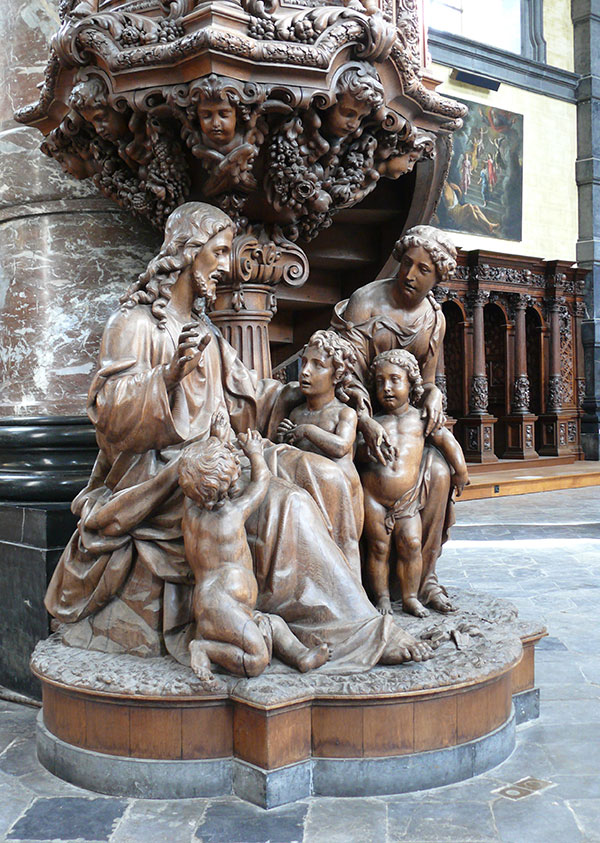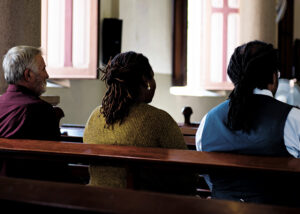I came across an editorial by Dick Benner a few months ago and was distressed to read about the late—and highly regarded—John Howard Yoder having sexually violated 80 women “at last count” (“Healing sexual abuse,” Sept. 2, 2013, page 2). This was news to me, as I am relatively new to the Mennonite circle.
Then I turned over a few pages and read that there was a work in progress to preserve this same John Howard Yoder’s work digitally (“Works of theologian John Howard Yoder to be digitized, published online,” page 17). This troubled me even more, and I felt I needed to know more, so I booked an appointment to see the person I would trust to tell me the straight goods.
Richard and I had an honest discussion about Yoder’s work and his flaws involving the sexual violation of women that he had power over, and how he justified this within his theology. He shared that Yoder was a brilliant man who had broken ground theologically that had helped many people, but there was this other side of his character that we needed to be honest about.
I told him that my heart was with all the lives that he had wreaked havoc on, and the outcome for them and their families. I then shared with him a little of my story of devastation from sexual abuse and the recovery process I have been in over the last 22 years. Richard asked me if I would be willing to share my story, and I pray now that my story may be helpful for others:
‘Don’t tell, don’t feel, don’t trust’
I was the first-born child of parents of Mennonite heritage. My parents were believers and they raised us in the church. We lived in farming communities while I was growing up. I was loved, but there were numerous issues in retrospect that I had no insight into. There was a code of “don’t tell, don’t feel, don’t trust—protect family no matter what.”
When I was 6, an extended family member started to sexually abuse me. This happened when my family would visit their family, which was a frequent occurrence since they just lived up the road from us. My parents were in the home when this happened and I was with a “trusted” person who was supposed to be caring for me and my brothers.
This was a very confusing time for me. I experienced feelings that should never be awakened in a child. Plus there were shame and guilt for the abuse and also for the feelings themselves. When I was 7, we moved away and the abuse stopped. But the confusion did not.
I became very concerned that I could be pregnant. When I was 9, after much consideration and with considerable anxiety, I spoke with my mother about my concerns. Her response—“this just is something that happens when you are a girl”—caused me to push the trauma and confusion deep into my soul, delaying my healing until much later in my life, with serious and long-reaching consequences.
First comes love, then comes marriage . . .
Bill and I met in high school and married when I was 21. I did tell him that I had been abused while we were going out, but assured him that it was in the past and all was okay; he accepted this and so did I, and our three-year courtship was sweet with few problems.
As soon as we got married, though, problems started and then grew. It seemed like this came out of the blue. But we were very much in love, and continued to believe that things would improve.
Cheryl came into our lives when we had been married for seven years, at which time we entered into four years of serious crisis in our marriage.
Not knowing where to turn when I found myself pregnant with our second child, I went to see the pastor of my parents’ church. I am convinced God used him to tell me what I needed to hear. By listening to me talk, he said it was clear that I still really loved my husband, and that if I was wanting to reconcile I needed to call him.
I called Bill and, although there was reluctance, we did get back together with the agreement that we would each work on our own issues and that we would reassess our marriage in a year’s time.
Journey to healing
After meeting with our pastor a couple of times for what I thought were marriage-related problems, he referred me to a Christian counselling service. I was blessed with a wonderful young therapist who was very insightful.
In my intake forms, I indicated that I had been sexually abused as a child. Meredith asked me if this had been dealt with. I said I felt it had been, but she suggested we change course for a while and look at this issue. I did not realize the journey this would take me on and how desperately I needed healing.
I still remember so clearly Meredith sending me home with the first chapter of a book on sexual abuse that she thought we might want to look at. The chapter was about coping mechanisms. I think I asked Bill about almost every coping mechanism listed, but he kept looking at me like I was from another planet. And it hit me—oh my goodness—this has really affected me!
And so I started the journey through therapy to healing. Meredith suggested that I have a verse to hold onto during this period, and offered Jesus’ words in John 8:31: “And you will know the truth and the truth will set you free.” I clung to this verse because I was becoming aware of what held me captive. Could Jesus really free me from all that I had become? I had to believe he could . . . and that he would.
For the first number of months I was paralyzed by all the emotion that started to come to the surface. There was a lot of anger about the loss of my childhood and my childhood memories, about how the abuse had shaped my life, and also anger towards the perpetrator.
There were days I could barely care for my children, but I made it through those first six months. During that time I wrote letters to the perpetrator. In the end I never sent them because the writing itself was what I needed to release the emotion.
The anger started to dissipate as I released the emotion that came to the surface. We talked a lot about behaviours that were affecting my day-to-day relationships, especially issues around control. This was by far my most troubling behaviour, as it was so interruptive to relationships, and I could see how it was definitely a contributing factor to the breakdown of our marriage.
Over time I came to realize that, because my mother had her own story, she could not help me when I had spoken to her when I was 9. This insight was very helpful and I was able to forgive her, realizing that she was not capable of helping me when she had never been healed herself.
I also started realizing the need to forgive was about me healing and not being stuck in bitterness and resentment. I began the process of forgiving the perpetrator. The work of forgiveness came in many layers. I remember Meredith saying that when a person has a serious accident because of a drunk driver, we do not rush to the scene and tell them that they will be healed if they will just forgive the perpetrator. The truth is, they still may need surgery, antibiotics and rehabilitation. Likewise, when we have emotional trauma, healing is a process and forgiveness is part of that process.
Our marriage redeemed
During therapy we started to unravel why Bill and I had such a wonderful courtship, but that problems started to surface as soon as we are married. Because the abuse had been such an out-of-control situation, I needed control of everything in my life, but the intimacy of marriage overwhelmed me. This escalated even more when I became pregnant and had our children, which at least in part explains the further deterioration of our marriage.
These issues and more were explored over a year-and-a-half of individual and group therapy sessions. There were times when I wanted to quit, but I was very motivated to work to save my family and to stop the cycle of abuse for my children. As I worked through the issues that had developed in my life, it was apparent that they were often directly related to the coping mechanisms I had once needed but were now no longer helpful or useful. I gained insight and found healthier ways to manage my life. This resulted in being a healthier partner to my husband and a healthier parent of my children.
There was an evening in group therapy when I had a significant spiritual breakthrough. We each drew a picture of ourselves with God and I drew him in an authoritative position with me basically cowering before him. I realized I was afraid of God; it was not a position of trusting, but of fear. That evening I realized that God loved me and I had a vision of him holding me on his knee, as Jesus had done with the children who came to him. For the first time I knew that God loved me, that Jesus was setting me free. And I was becoming free indeed.
Through therapy Bill stood with me and supported me, which showed me how much he loved me, and how committed he was to our marriage and to God’s plan for us. Before I completed therapy Bill and I attended a weekend marriage seminar, from which we learned many communication tools that have helped us over the years. And at the end of the weekend we recommitted our vows to each other. This was one of the happiest days of my life. Our marriage had been redeemed.
Jesus is a gentle healer
My journey did not end with the end of therapy. Control issues, in particular, would resurface when I was under stress. I gave Bill permission to address issues as they came up, and, although it was difficult, through his support and God’s intervention victory was gradually being won. Because control is my auto-response, it still can resurface when I’m under stress, but I have clearer insight now and rely on Jesus to show me the early signs.
After 22 years, I have come to see that Jesus heals us gently. He comes to us when we are ready and shows us the truth and then leads us in his way, a way that brings redemption to that area.
Because of the abuse, I had no boundaries. It was years after therapy that I realized that this was an issue. The amazing thing is that God showed me this as my children needed my guidance in learning boundary-setting skills in their own lives. I had to set healthy boundaries first with my family. Although it was challenging, God helped me step by step, often using Bill to help me gain insight.
Today, I am happily married to the same man that I once thought was the worst husband in the world, have two wonderful children, and am nearer to God than I have ever been, because in his grace and power Jesus redeemed my life. I also have a healthy, respectful relationship with most family members.
Journey to freedom
I have shared my story in the past for the same reason I agreed to share it in print: because very sadly there are so many people affected by abuse. My journey to freedom so far is 22 years and mine is just one story.
But what of the 80 women affected by Yoder? Personally, I am happy to know that the work on this is not complete, that there is a Mennonite Church U.S.A. task force reaching out to the women and their families who have been affected, and that Anabaptist Mennonite Biblical Seminary and MennoMedia have issued statements in regard to approaching Yoder’s work while acknowledging his sexual misconduct.
What, though, of the many other women and children who are affected in our other community and church circles? For those reading my words, does your life resemble the tragedy that was my life? Is abuse in your history? If so, how has it harmed your life?
I can truly attest that I have a redeemer who freed me from captivity, who helped me overcome the detriments in my life, who offset the bad effects of the abuse, who showed me I am worthwhile, and who bought me back from the abyss. Jesus is in the business of redeeming lives. He redeemed mine, and he can redeem yours too!
* The author seeks anonymity not because of shame, but to protect the privacy of those referenced in the story. Anyone wanting to discuss the issue with her should contact Editor/Publisher Dick Benner, who will then forward a message to her.
For discussion
1. Why do some of us find it so difficult to talk about sexual abuse? What is it about sexual abuse and allegations of misconduct that makes them so hurtful? Is sexual misconduct an open subject in your congregation? How important is listening in the healing process?
2. What steps has your church taken to protect children, youth and other vulnerable people? Do you have a safe church policy? How effective is it? How rigorous are you in applying it to volunteers who work with children and teens?
3. If allegations of sexual misconduct surfaced, what are the first steps that your church would take? Does your church have access to resources such as the Sexual Misconduct and Abuse Response Resource Team (SMARRT) of MCC Ontario (www.mcco.ca/restorative/smart)? What are the challenges of dealing with such allegations? What role should the news media (including this magazine) play in covering allegations of sexual misconduct?
4. If sexual abuse is a by-product of unhealthy sexuality, how can we work at improving healthy sexuality? How can we work at breaking the cycle of abuse? Why is it important to talk about these issues, even if they make us uncomfortable?







Leave a Reply
You must be logged in to post a comment.